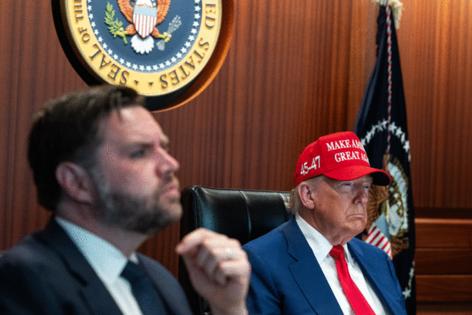Andreas Kluth: Just the threat of US nuclear testing is bad enough
Published in Op Eds
Just as nuclear war, in all its sheer insanity, has returned to Hollywood and public attention, the leaders of the world’s two atomic superpowers seem to be doing their best to make the jitters worse.
First, Russian President Vladimir Putin, who’s been breaking nuclear taboos for at least three years, boasted about a (new-ish) torpedo drone and a nuclear-powered (and possibly nuclear-armed) cruise missile. Apparently in response, President Donald Trump then posted on social media that the U.S. would “immediately” start “testing our Nuclear Weapons on an equal basis.”
Leave aside what “on an equal basis” might mean and just take Trump’s post literally. He seems to want to start detonating nuclear warheads again — as one of his former national-security advisers recommended last year.
The United States last tested a live warhead in 1992. Since the 1990s, however, only one country has exploded fission bombs (North Korea, six times). The eight other nuclear powers have instead abided by the Comprehensive Nuclear-Test-Ban Treaty, which 187 countries have signed.
Because the U.S., Russia, China and several others have yet to ratify the treaty, it isn’t technically in force. But for three decades, a de facto moratorium on testing has held up. It represents one of the so-called nuclear taboos meant to preserve stability.
What would happen if the U.S. started testing again?
Domestically, Trump would have himself a big political problem. The explosions would presumably take place at the existing test site in Nevada. If the warheads aren’t too big, the fallout of an underground detonation should be containable. Then again, Las Vegas and its sprawl have inched closer to the test site since 1992, and Nevadans and their congressional delegation would kick up a huge fuss, possibly splintering the MAGA coalition just as the midterm elections come due. Trump can’t want that.
Internationally, an American breach of the moratorium would liberate Russia, China and the other nuclear powers, including Pakistan and India, to have at it too. The question then becomes who “benefits” most in relative terms.
Jeffrey Lewis, an expert on nukes at the Middlebury Institute of International Studies at Monterey, told me that America would gain almost nothing, whereas China would leap ahead in developing its arsenal and catching up with the U.S.S. The reason has to do with data and the software to crunch it.
Between 1945 and 1992, the U.S. tested by far the most warheads, a total of 1,030 (not counting the ones dropped on Hiroshima and Nagasaki) out of 2,056. So it has the most data about the physics of fission, which it can feed into its state-of-the-art algorithms to design new warheads, which then don’t need testing.
Russia also has a lot of data (from 715 Soviet tests) but lags in crunching power. China, by contrast, only has data from 45 tests, but computing prowess that is at least equal to America’s.
If everyone were to start testing again, China would “learn the most” and advance asymmetrically, Lewis told me. That’s not an outcome that Trump could possibly desire. (As it happens, he fired off his Truth post just minutes before meeting Chinese President Xi Jinping.)
A resumption of testing by the big three, Lewis added, would also “contribute to a general sense that nuclear weapons are here forever and an important tool for being a big state, and countries that want to be big state should want to get into the nuclear business.” That means proliferation.
North Korea already absorbed the malignant lesson that states which give up their nuclear programs (such as Libya or Ukraine) may end up getting bombed, whereas going nuclear seems to keep countries safe. Other nations have noticed too.
The worst consequence would be the least quantifiable, Daryl Kimball at the Arms Control Association in Washington told me: It’s the fallout of the U.S. “becoming a rogue state” in the system. Putin has already broken one taboo (never threaten the use of nukes); North Korea and others have chipped away at another (against proliferation); China is breaching a third (don’t increase your existing arsenal). (1)
If the U.S. were now to blow up the taboo against testing, the world would become anarchic enough that somebody, somewhere, someday might break the ultimate taboo — and use nukes for the first time since 1945. No responsible world leader, least of all one who craves a legacy as “peacemaker,” could reasonably want to take this risk.
The good news is that this means that America, no matter what goes down on Truth Social, probably won’t resume nuclear testing. The bad news is that we even have to talk about it.
____
(1) Technically, the U.S., Russia, China, the UK and France are already in breach of Article VI of the Non-Proliferation Treaty, which obliges them “to pursue negotiations in good faith […] to nuclear disarmament.” Instead, all five are modernizing their arsenals, and China is growing it.
____
This column reflects the personal views of the author and does not necessarily reflect the opinion of the editorial board or Bloomberg LP and its owners.
Andreas Kluth is a Bloomberg Opinion columnist covering US diplomacy, national security and geopolitics. Previously, he was editor-in-chief of Handelsblatt Global and a writer for the Economist.
©2025 Bloomberg L.P. Visit bloomberg.com/opinion. Distributed by Tribune Content Agency, LLC.
























































Comments